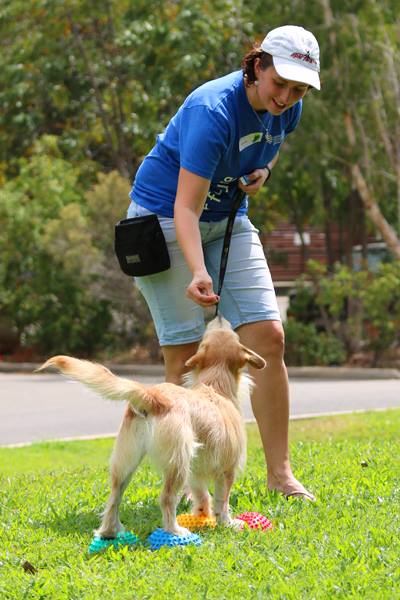 We have all experienced the frustration of being at the end of the leash while our dog bounces around and seems to be ignoring us completely. Most commonly this happens when something exciting is going on, such as when you attend a training class, take your dog for a walk, or even just when visitors arrive. “But he knows this!” we hear time and time again, while the dog becomes more frantic and the owner more frustrated.
We have all experienced the frustration of being at the end of the leash while our dog bounces around and seems to be ignoring us completely. Most commonly this happens when something exciting is going on, such as when you attend a training class, take your dog for a walk, or even just when visitors arrive. “But he knows this!” we hear time and time again, while the dog becomes more frantic and the owner more frustrated.
But does he really know what you’re asking? Have you trained that behaviour?
All too often we forget that our dogs are terrible at generalising. This means that while they know how to sit on cue at home, in the lounge room, when we have a handful of treats, they don’t easily make the leap at realise that the same rules apply in new situations as well. We have to go through and break it down for our dog.
Before you take your dog to that busy dog park, or popular walking track, think about the skills he will need to be successful. Does he know how to walk beside you on leash? Focus when other dogs are around? Sit before crossing the road? Watch bikes and scooters pass without barking? Now, think about whether you have helped your dog achieve those skills.
We are often in such a hurry to go places with our dogs that we forget to take the time to prepare them for these things. Training starts at home, but it doesn’t finish there. You need to help your dog learn that training doesn’t stop when we step out of the house. Practice training in the front yard, and on walks around quiet neighbourhoods. Carry treats, reward good behaviour. As you and your dog become successful in these new environments you can gradually increase the challenge. We have to teach our dog that listening pays off, no matter where we are or what’s happening around us.
Failure to train these essential skills leads to frustration, for both you and your dog, and frustration leads us to do some pretty silly things. When we feel frustrated we are more likely to behave reactively, such as yanking on our dogs lead, or scolding them. When we recognise that our dogs simply don’t have the training or the skill set to behave the way we want, we can see that the responsibility lies with us to teach our dog.
If you are having trouble with your dogs behaviour, stop and think about the training you have done and whether it is enough. Join a reward-based chat group, or better yet contact a reward-based trainer for help.
